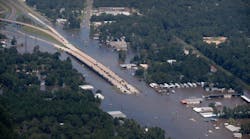Hurricane Harvey has struck a significant blow to the Houston, Texas metro area, home to the sixth largest import terminal in the world, as well as all of the shipping lanes in the Gulf Coast area. Given the strong economic linkages between the gulf coast and the country as a whole, Harvey is a disaster that will impact the U.S. economy far beyond that of the gulf coast.
The Institute for Supply Management conducted a special survey that asked members to assess how Harvey might impact six key business metrics and whether they may be impacted by shortages of input materials due to Harvey.
"Our hearts are with the individuals and businesses that have been affected by Hurricane Harvey,” said Thomas W. Derry, CEO of Institute for Supply Management. “The human and corporate impact are significant. Indeed, the results of our ISM Report On Business Survey indicate ongoing challenges for U.S. companies with pricing, supplier deliveries, and certain commodities because of the storm. We are encouraged, however, by data indicating that the effect on production, new orders, and employment will be relatively minimal."
"As we continue to see the implications of Hurricane Harvey and prepare for Hurricane Irma, I hope that we can continue to come together as a community to support those in need," Derry added.
The survey found that two-thirds (67%) of responding supply managers believe input materials pricing will be at least somewhat negatively impacted over the next three months with greater than one-quarter (27%) expecting prices to be negatively or very negatively impacted.
Additionally, a majority (56%) of respondents believe supplier deliveries will be at least somewhat negatively impacted over the next three months with nearly one-fifth (19%) expecting deliveries to be negatively or very negatively impacted.
The manufacturing PMI and non-manufacturing NMI summarize supply managers’ reports as to how their organizations fared in the past month with regard to a set of key business metrics. For manufacturing, those metrics are new orders, production, employment, supplier deliveries, and inventories of input materials. For non-manufacturing, those metrics are new orders, business activity (the analog of production), employment, and supplier deliveries. The first section of the special survey asked members of the Manufacturing and Non-Manufacturing Business Survey Committees to assess as best they could how Harvey might impact those metrics over the next three months and six months. Additionally, both committees were asked about potential impact on input materials pricing and non-manufacturing committee members were also asked about inventories of input materials.
Broadly speaking, the six metrics organized by severity of impact into three groups. Prices of input materials and supplier deliveries of input materials, not surprisingly, comprised the group of metrics most likely to be negatively impacted by Harvey. Production, new orders, and inventories of input materials comprised the second group. Employment was the only metric in the third group of least impacted metrics. Notably, even though the clean-up and rebuilding of the Texas coast is only in its earliest stages, more than 95% of respondents were consistently able to assess the impact of Harvey on these metrics. This very low level of uncertainty is unusual.
Most Impacted Metrics
Respondents expect that prices and speed of delivery will be most strongly impacted. Overall, 67% of respondents expect at least some negative impact to prices over the next three months with 27% of respondents expecting negative to very negative impacts. Even six months out, a majority (56%) expect at least some negative impact on prices. The manufacturing sub-sectors are more concerned than their non-manufacturing counterparts about negative price impacts three and six months out.
The findings with regard to supplier deliveries are similar, but less dramatic. Overall, 54% of respondents expect at least some negative impact to deliveries over the next three months with 19% expecting negative to very negative impacts. Six months out, a more than one-third (36%) expect at least some negative impact on prices. The manufacturing sub-sectors are notably more concerned than their non-manufacturing counterparts about slowed deliveries three and six months out.
Moderately Impacted Metrics
Respondents expect that production/business activity, new orders, and inventory level will be somewhat impacted by Harvey. For each of these metrics overall, three months out, a majority of respondents feel Harvey’s impact will be neither positive nor negative. In the near-term, about one in five are concerned about somewhat negative impacts on these metrics, but only roughly one in ten foresee more negative impacts. Six months out, only a very small proportion of respondents are concerned about negative or very negative impacts. Because Texas is known for producing manufacturing inputs, it’s not surprising that manufacturing sub-sectors are more concerned as compared to their non-manufacturing counterparts about negative impacts three and six months out.
Least Impacted Metrics
Employment is the key metric least likely to be negatively impacted by Harvey. More than 80% of respondents expect that employment will be neither positively, nor negatively impacted by Harvey. Interestingly, there are indications that employment in non-manufacturing sectors may be slightly more negatively impacted than manufacturing sub-sectors.
Predictably, respondents expect that fuel and petrochemical feed stocks and derivatives could be in short supply three months out.
The following key commodities were most often mentioned as those that could potentially be in short supply over the next three months: Fuel; Plastic Resins; Chemicals; Electronic Components; Feedstocks, Chemicals (raw); Gasoline; Polypropylene; Resin Based Products; Building Materials; Electrical Components; LDPE; Plasticizer; Caustic Soda; Ethylene; HDPE; LLDPE; Methyl Methacrylate; Petroleum Based Products; and Isocyanate. Many more individual commodities were mentioned, but not frequently enough to list here.
With regard to industries which may be impacted by shortages, the following sectors mentioned the broadest number of commodities: Plastics & Rubber Products; Food, Beverage & Tobacco Products; Wholesale Trade; Machinery; Chemical Products; Transportation Equipment Manufacturing; Professional, Scientific, & Technical Services; Utilities; Apparel, Leather & Allied Products; Computer & Electronic Products; Furniture & Related Products; Government; Construction; Paper Products; and Primary Metals. In all, 27 of the 36 industries reported potential commodity shortages.



